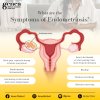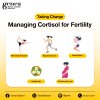Fertility Awareness: Essential Tips for Couples Trying to Conceive

Having a baby has always been a big and personal topic for couples. But these days, with busy careers, more stress, and people waiting longer to start a family, it can feel harder than ever to conceive. We get that its not always easy, so weve put together some helpful tips to support you on your journey to parenthood and enhance your fertility.
1. Understanding Your Fertile Window
Ovulation is when the ovary releases an egg, and it usually happens 12-16 days before your next period. This gives you a fertile window of about 5-6 days, the best time to try for a baby.
How to Track Ovulation:
Body Temperature: Your temperature rises slightly after ovulation (about 0.5-1°F or 0.3-0.6°C).
Cervical Mucus: It becomes clear, slippery, and stretchy during ovulation (similar to egg whites).
Ovulation Kits: These detect an increase in LH (luteinizing hormone) 12-36 hours before ovulation.
The easiest way nowadays is to use apps and trackers, which help monitor your cycle and predict fertile days based on patterns from previous months, ultimately enhancing your fertility awareness.
2. Timing Intercourse Right
Getting the timing right increases your chances of conception. Sperm can live for up to 5 days inside your body, so try to have sex every 1-2 days during your fertile window. If tracking cycles feels stressful, having sex 2-3 times a week is a good way to cover all bases without the pressure.
3. Male Fertility: What You Need to Know
You might think that female fertility is the only thing that matters, but male fertility plays a significant role too. Eating well, exercising, and avoiding smoking or heavy drinking can improve sperm quality.
Another small but helpful tip is to avoid heatlike hot tubs or resting laptops on your lapsince high temperatures can affect sperm production. Regular ejaculation every 2-3 days also helps keep sperm healthy and active. Sometimes, a few small lifestyle changes can make a big difference in your fertility journey.
If lifestyle changes and tracking your cycle arent quite enough, it might be time to speak with one of our fertility specialists.
4. Healthy Lifestyle for Fertility
A healthy lifestyle can significantly improve fertility. Here are some key lifestyle factors to consider:
- Balanced Diet:
- Consume a diet rich in fruits, vegetables, whole grains, and lean protein.
- Include foods rich in antioxidants, such as berries and leafy green vegetables. - Regular Exercise:
- Engage in moderate exercise like walking, swimming, or yoga.
- Avoid excessive exercise, which can negatively impact fertility. - Stress Management:
- Practice stress-reducing techniques like meditation, yoga, or deep breathing.
- Get enough sleep. - Limit Alcohol and Caffeine:
- Excessive alcohol and caffeine consumption can negatively impact fertility. - Maintain a Healthy Weight:
- Being overweight or underweight can affect fertility. Strive for a healthy BMI.
By incorporating these lifestyle changes, you can enhance your overall well-being and improve your fertility.

At Genea, we know that every fertility journey is different, and were here to offer the personalized care you deserve. Whether youre beginning treatments like IVF or ICSI, considering egg freezing, or simply exploring your options.
What makes us stand out isnt just the advanced technology we useits the care and heart we bring to every journey. Many of our patients come to us after facing difficultiessuch as multiple failed IVF cycles, miscarriages, or receiving discouraging diagnoses from other clinics. But with the right care, guidance, and access to advanced solutions, theyve been able to turn their hopes into reality.
Weve spent decades at the forefront of fertility science, constantly improving outcomes for our patients. Our Geri® incubator system offers an optimal environment for embryos, improving their quality and boosting live birth rates. We also offer genetic testing (PGT-A, PGT-M) to help select the healthiest embryos.
Navigating fertility can feel overwhelming, but it doesnt have to be. You can start by trying the tips above or exploring an approach that feels right for you. And when you're ready to take the next step, well be here to helpevery step of the way.


